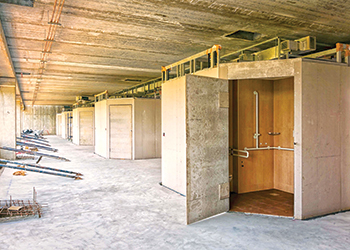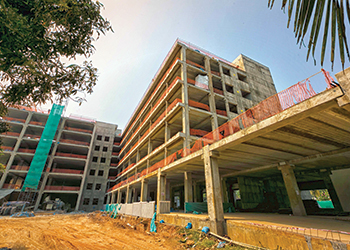KEF grows ‘catalogue hospitals’ vision
01 April 2016
The UAE is witnessing a lot of demand for infrastructure development, particularly in the healthcare sector, as Dubai gears up for Expo 2020 and looks to establish itself as a medical tourism hub, according to KEF Holdings, a company specialising in innovative offsite construction technology.
“In 2016, nearly 37 per cent of spending, or Dh16.9 billion ($4.6 billion), will go towards health, education, housing and community development, compared with Dh14.3 billion ($3.9 billion) in 2015,” says Faizal Kottikollon, chairman and founder of KEF Holdings, which is headquartered in the DIFC (Dubai International Financial Centre).
Currently, demand from an increasing population in the region far outstrips the supply of durable, affordable, quality infrastructure. The adoption of mandatory health insurance in the UAE will drive growth in the sector.
To address this requirement, KEF Holdings – through its subsidiary joint venture company, KEF-Tahpi – is promoting the ‘Catalogue Hospitals’ concept in the Middle East.
Based in Dubai Healthcare City, the studio is a joint venture of KEF Holdings and Australia-based Tahpi.
The KEF-Tahpi ‘Catalogue Hospitals’ concept offers clients the convenience of choosing design options from a catalogue with a view to reducing project costs and timeframe of implementation.
“Offsite manufacturing and construction addresses the critical needs through streamlined, uniform, quality processes. The use of this technology industrialises the entire construction process by leveraging robotic systems, automation, computer-aided design and computer-aided manufacturing. Applying this model to the healthcare industry means that hospital and clinic components can be carefully designed in the studio, and then manufactured on a large scale in a facility dedicated to offsite and modular construction.
“The GCC has been extremely receptive of advancing construction technologies in light of the region’s surging infrastructure development and its various construction needs to action large projects in the pipeline,” he says.
KEF will see the opening of its first modular facility for the production of prefabricated hospital modules in the UAE later this year in Jebel Ali, Dubai, into which it has invested close to $100 million. Through this facility, the company will be able to provide economically sustainable and innovative solutions in healthcare infrastructure to the GCC region.
Combining Tahpi’s technologically superior healthcare design expertise with KEF’s unique offsite modular construction capabilities, KEF-Tahpi Design Studio promises to significantly reduce the cost and time required to deliver a healthcare project.
The studio is a pioneer in building modular healthcare facilities using the three principles of standardisation, industrialisation and commoditisation to drive prices down whilst maintaining and improving quality.
“KEF-Tahpi Design Studio brings a new brand of thinking, backed by cutting-edge technology, to the healthcare sector. It will change the way infrastructure is designed and delivered for the industry,” says Kottikollon. “The studio also provides services to convert any existing plans into the modular equivalent, ready for delivery and assembly. Although this solution will not be as efficient as the existing range of 10 fully designed modular catalogue hospitals, they will nevertheless provide substantial cost and time saving.”
 |
|
Under construction ... modular toilets inside the PMHP Hospital in India. |
Advantages
The ‘assemble’ rather than ‘build’ solution brings about a paradigm shift in terms of healthcare infrastructure development, Kottikollon says.
“The major advantage of this industrialised approach to healthcare design and modular construction is that it offers clients the convenience of choosing options from a design catalogue and reduces project costs and timeframe of implementation by almost 50 per cent,” he points out.
Currently, KEF is overseeing the construction of its pilot project – a 500-bed tertiary hospital in Calicut, India, which will be built in two phases. The PMHP Hospital is set to be India’s first healthcare facility designed and built completely offsite. Phase One of the project with 205 beds is scheduled for completion in Q3 2016, which will be less than two years since the beginning of construction on the project – as compared to the four- to five-year industry average to build a healthcare facility using conventional construction methods, he claims.
The project in Calicut is being facilitated by the KEF-Tahpi Design Studio.
Future plans
He adds: “We will continue to establish ourselves as innovators and change agents in the construction industry. Our focus will be on the technology we are bringing to this market, by way of robotics and automation in construction. Off-site manufacturing is still relatively new in the region, but we believe there is huge potential for the technology because of its ability to deliver projects quickly, efficiently and to the highest quality standards.
“For us, the next five years look to be a period of growth, expansion and continuation of the work we have begun implementing over the last few years. By 2020, we project our revenue to be approximately $1.6 billion. We are also looking to expand into the European and Asian markets.
“Healthcare and education will continue to be our focus sectors, and there will be an increased focus on the affordable housing sector as demand in each of those sectors continues to grow both in the GCC, India and around the world,” he concludes.
- Emirate extraordinaire
- Dubai projects at a glance
- Precious jewel
- High-end residences
- Green and gated
- Paschal systems help contractors galore
- Ideal Standard brands meet diverse needs
- Dubai Solar Park sets global standards
- Autodesk 3D solution cuts time, cost, flaws
- Making Ground blazes a trail with Evaglow
- KEF grows ‘catalogue hospitals’ vision



